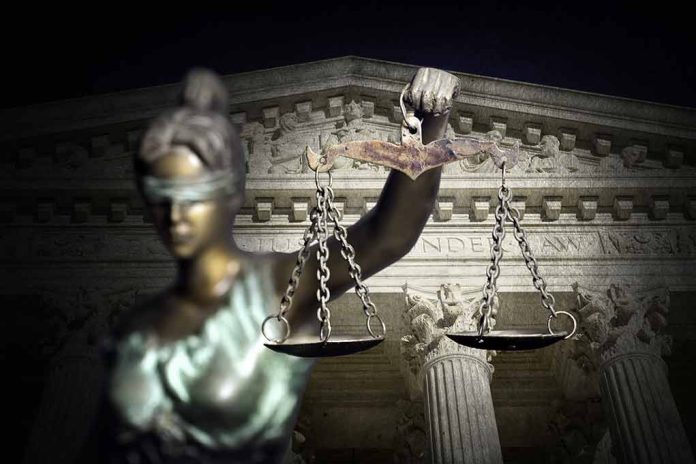
The Supreme Court has rejected a Republican challenge to President Biden’s executive order aimed at expanding voter registration, potentially altering the landscape of future elections.
At a Glance
- Supreme Court dismisses GOP lawsuit against Biden’s voter registration expansion order
- Republicans argued the order unconstitutionally interferes with state election authority
- Lower courts previously rejected the lawsuit, citing lack of legal standing
- Decision follows a series of legal setbacks for Republicans challenging voter laws
- Ruling intensifies debate on federal involvement in expanding voter access versus state sovereignty
Supreme Court Rebuffs Republican Challenge
In a significant blow to Republican efforts to halt President Biden’s executive order on expanding voter registration, the Supreme Court has rejected a challenge from GOP lawmakers. The decision, announced on October 7, effectively allows the administration’s directive to stand, igniting fresh debates on the balance of power between state and federal control over election processes.
The case, known as Keefer, Dawn, et al. v. Biden, was brought by Republican lawmakers from Pennsylvania and other GOP officials. They argued that Biden’s 2021 executive order exceeded presidential authority and infringed upon state powers to manage elections. However, their arguments failed to persuade the highest court in the land, marking another in a series of legal defeats for Republicans challenging voter laws and procedures.
The Supreme Court on Monday turned away a challenge from Republican state lawmakers in Pennsylvania to a Biden administration executive order that is intended to boost voter registration. https://t.co/8htEXNMJNB
— NEWSMAX (@NEWSMAX) October 7, 2024
Details of the Executive Order
President Biden’s executive order, which has now withstood legal scrutiny, mandates federal agencies to provide voter registration services. This aligns with the National Voter Registration Act of 1993, also known as the “Motor Voter” law. The order’s supporters argue it merely expands on existing legislation to increase voter participation, while critics warn of potential Democratic advantages and erosion of state control over elections.
The US Supreme Court turned away a challenge to President Biden’s three-year-old voter-registration initiative, steering clear of a fractious political fight in the run-up to the November election. https://t.co/5Sm0tW1S6j
— Bloomberg Government (@BGOV) October 7, 2024
Legal Journey and Republican Opposition
The journey to the Supreme Court began when nine Republican secretaries of state and 11 members of Congress sought intervention, arguing that the executive order was an unconstitutional interference in the upcoming November election. Lower courts, including the U.S. District Court for the Middle District of Pennsylvania, had previously dismissed the lawsuit due to a lack of legal standing.
BREAKING: The U.S. Supreme Court won't review a case from Pennsylvania GOP lawmakers seeking to revive the right-wing independent state legislature theory and challenge President Biden's 2021 executive order expanding voter registration.https://t.co/bouwxWNxLH
— Democracy Docket (@DemocracyDocket) October 7, 2024
Despite these setbacks, Republican leaders continue to voice opposition to federal efforts to expand voter registration. The Supreme Court’s decision to reject this latest challenge, however, solidifies a trend of courts, including the highest in the land, upholding Biden’s voter registration policies as constitutionally sound.
Implications for Future Elections
The Supreme Court’s decision carries significant implications for the upcoming elections and beyond. By allowing the executive order to stand, federal agencies will continue their efforts to provide voter registration services, potentially increasing voter participation across the country. This development has intensified the ongoing debate about the appropriate level of federal involvement in expanding voter access versus maintaining state sovereignty over election processes.
As the nation moves closer to critical elections, this ruling underscores the complex interplay between federal initiatives and state authority in managing the electoral process. While supporters of the executive order celebrate this as a victory for voter accessibility, opponents remain concerned about the potential for partisan advantage and the erosion of state control over elections.
The Supreme Court’s decision marks a pivotal moment in the ongoing struggle over voting rights and election management in the United States. As federal efforts to expand voter registration continue, state-level responses and further legal challenges may shape the landscape of American democracy for years to come.
Sources:
- Supreme Court rejects Republican-led challenge to Biden effort to ease voter registration
- Supreme Court Rules Against Republicans in Election Case Against Biden
- Supreme Court Rejects Republican-Led Challenge to Biden Effort to Ease Voter Registration
- Supreme Court rejects Republican-led challenge to Biden effort to ease voter registration
- Supreme Court Rules Against Republicans in Election Case Against Biden






